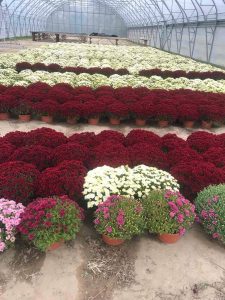
- About BDF
- Programs
- To banks
- For enterprises
- News BDF
- Public information
- Home
- Success stories
- 50 kilowatts of hope: how a company from a small village in Lviv region holds Ukraine’s flower market and switches to solar energy
50 kilowatts of hope: how a company from a small village in Lviv region holds Ukraine’s flower market and switches to solar energy
In the village of Dobrosyn in the Lviv region, the family-owned company PE Bonus has been operating for over 30 years. Among greenhouses, warehouses, and flower beds, the team of Viktor Tsiupka grows and supplies planting material across Ukraine. Tulips, daffodils, petunias, begonias, marigolds – all are ordered both by municipal landscapers and small private producers from all over the country.
A choice that turned into a life’s work
“It was a free market – the flower segment didn’t have much competition, and we liked it. Gradually demand formed, and we expanded. That’s how we stayed in it,” says Viktor Tsiupka, director and owner of the company.
Bonus imports seeds and bulbs from the Netherlands, Germany, the UK, USA, and New Zealand. Part of the seedlings are grown locally in greenhouses. Sales – through an online store, and also to farmers, municipalities, and city landscaping departments.
Flowers – even during war
 After the full-scale invasion began, the company suspended operations. Viktor admits: at first it seemed like flowers would have to be forgotten for a long time. But by late March, customers started calling on their own.
After the full-scale invasion began, the company suspended operations. Viktor admits: at first it seemed like flowers would have to be forgotten for a long time. But by late March, customers started calling on their own.“I was surprised. They called and said: ‘What about the seedlings? Will there be orders?’. And we had only just started recovering from the shock… But it was a signal – time to work,” recalls Viktor.
Despite the war, flower deliveries didn’t stop. Tulips grown from imported bulbs are available for sale across Ukraine starting in January-February. And flower bed seeds are sown yearly in Kharkiv, Kyiv, Dnipro, Odesa, Kherson – even in cities under shelling.
“There was one client from Sumy region. She said: ‘I’m now in Austria, my city is under occupation. But don’t cancel the order. We’ll return, and everything will be fine,’” he remembers. “These are our people.”
Logistics, blackouts and constant adaptation
For obvious reasons, logistics became harder. If earlier seeds arrived by plane directly to Lviv in two days, now delivery takes two weeks – via Poland and land routes.
There were also problems with electricity. Without power, greenhouses stopped, the office lost heat, connectivity, and access to accounting systems. In greenhouses with electric heating, power outages meant complete shutdown.
“We had been eyeing solar energy for a long time, but kept putting it off.” Around that time, Viktor learned about the grant “Support for the Energy Resilience of Micro and Small Enterprises in Ukraine.” The team applied, and after a few months of waiting, their application was approved.
Within the support package, the company received a grant combined with a bank loan. With these funds, they installed 100 solar panels with a total capacity of 50 kW and an inverter for 100 kW.
“Now everything is installed and working. In sunny months – from April to October – we’ll be able to cover 70–80% of our needs. That’s serious savings,” explains the entrepreneur.
Next – batteries and full independence
The team is planning the next step: buying battery storage systems. These will allow them to accumulate energy during the day and use it at night. This way, the company will become almost fully energy-independent, cutting costs on commercial electricity and no longer needing generators.
“It’s a smart investment. You pay once and in 5–6 years it pays off. And then – savings and stability,” says Viktor.
Today, the company continues to deliver flowers to all regions of Ukraine. Despite the challenges, the business is alive, working, and adapting. And flowers, as a symbol of life, bloom even in the toughest times.
“Support is motivation. When someone supports you, you want to grow, move forward. And now – we know that our flowers are truly needed. So, it wasn’t in vain,” sums up Viktor Tsiupka.
_____________
This publication was prepared within the support of the international cooperation project “Energy resilience support for micro and small enterprises in Ukraine” under the ReACT4UA Program (Utilization and Implementation of the Association Agreement between the EU and Ukraine in the field of Trade) that is co-funded by the German Government and the Norwegian Agency for Development Cooperation (NORAD). It is implemented by the German federal company “Deutsche Gesellschaft für Internationale Zusammenarbeit (GIZ) GmbH”.
The project aims to increase the resilience of the Ukrainian economy to recurrent power outages and assure business continuity of Micro, Small and Medium Enterprises (MSMEs) by financially supporting solutions for an uniterrupted access to electricity.
The content of this publication is the sole responsibility of the Business Development Fund and does not necessarily reflect the views of the Government of Germany, NORAD, or GIZ.